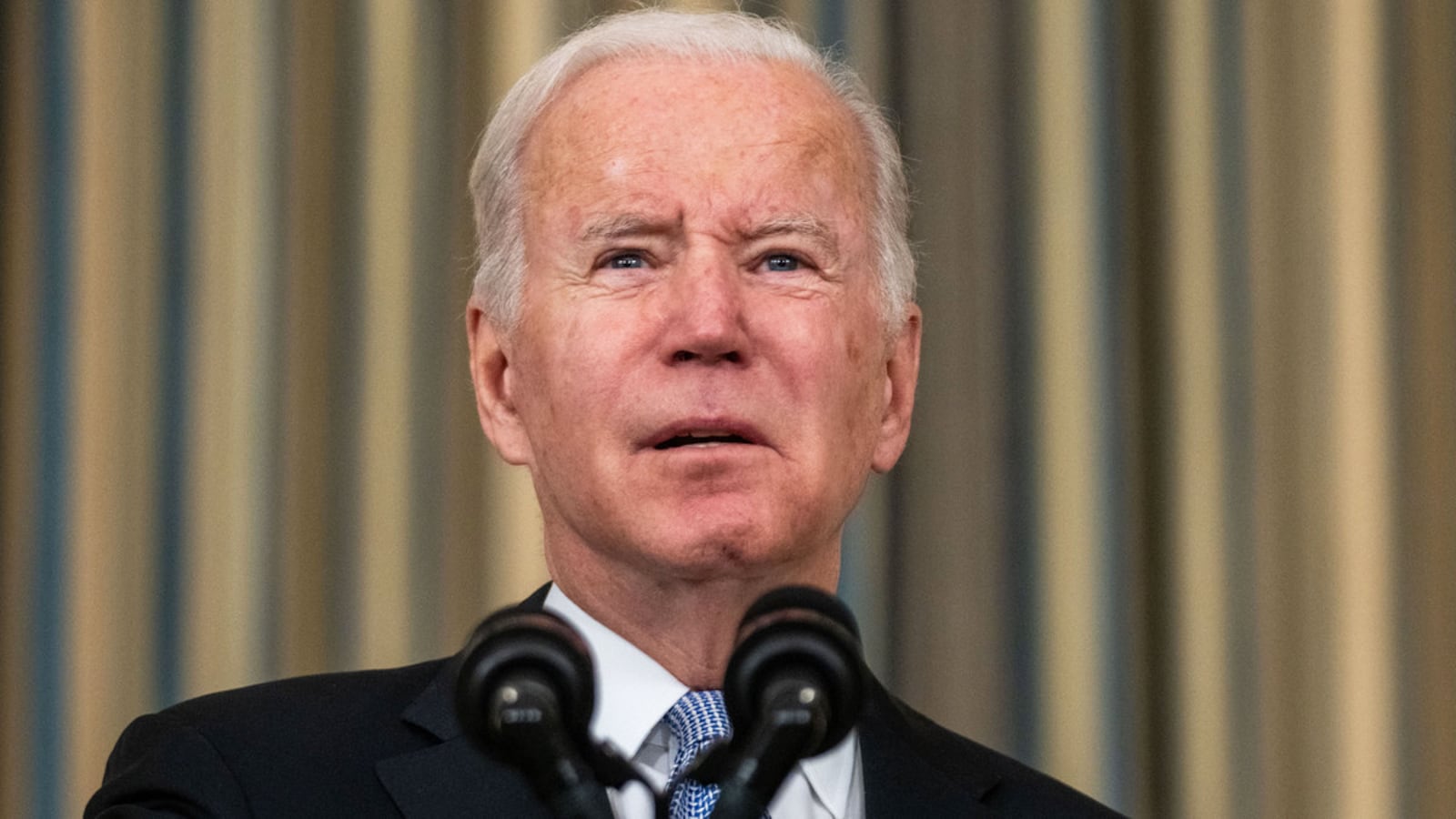A few things happened while Democrats started making peace in a months-long internal war on Capitol Hill.
President Joe Biden’s approval ratings sank to a new low. The party’s chances of holding its House and Senate majorities in 2022 look shakier than ever, according to several polls. And on Election Day 2021, Democrats cratered, losing the Virginia governorship for the first time in 12 years and barely scraping out Gov. Phil Murphy’s re-election in deep-blue New Jersey.
Three days later, Democrats finally picked up some momentum toward enacting their agenda. On Friday night, the House sent a $1.2 trillion infrastructure bill to Biden’s desk after a lengthy impasse, and the chamber teed up consideration of a sweeping $1.75 trillion social spending package, titled the Build Back Better Act.
But Democrats’ Election Night calamity—and the mounting signs that keeping their congressional majorities in 2022 will be a miracle—haven’t shaken their resolve to muscle through a bill that Republicans can’t wait to campaign against.
If anything, Democrats are feeling even more urgency to pass their social spending bill through Congress, even if some lawmakers are grappling with the very real prospect that, in this political environment, a yes vote could cost them their seats.
During a Tuesday appearance on the New York Times podcast The Daily, Rep. Abigail Spanberger (D-VA), a top GOP target, joked, “There will be so many attacks based on this bill, I could write some of them myself.”
Spanberger didn’t discount the possibility that the Build Back Better Act, if poorly sold, could send Democrats like her packing. But she expressed confidence that Democrats can sell it—even if they’ve collectively failed to do that so far—and plenty of her colleagues feel the same way.
“We’ve lost control of the narrative,” said Rep. Gerry Connolly (D-VA), who argued that the election results in his home state amounted to a “clear warning” for Democrats and a need to go to “DEFCON-2.”
But Connolly told The Daily Beast that the party shouldn’t get “overly wrapped up” in today’s bad polling numbers, even if he allowed that it is a “low point” for them so far.
“We have an opportunity, if we’re smart, if we stop our own internal squabbling and unify, if we get sharp and disciplined about messaging… we can tout the good news we are bringing, and will bring, to every corner of the country,” he told The Daily Beast.
The political headwinds of recent weeks seem to have Democrats thinking about the political impact of their marquee bills in a different light. Rep. Jake Auchincloss (D-MA) summed up the consensus among many Democrats by explaining the belief that voters will make up their minds in 2022 over two key questions: whether COVID is behind us, and whether a strong economy is ahead.
If voters are unconvinced that Biden has made headway on those two fronts, many in the party believe it won’t matter whether the Build Back Better Act is a hit or a flop; Democrats will lose their majorities regardless.
“If COVID is significantly behind us, and if the economy continues to post job gains at a level of hundreds of thousands per month, Democrats will have something visible to run on,” said former Rep. Steve Israel (D-NY), who chaired the party’s official House campaign arm from 2011 to 2015.
“If those conditions don’t exist,” Israel said, “passing all the legislation in the world is not necessarily going to translate into votes in competitive districts.”
A senior House Democratic aide, speaking anonymously to candidly describe sentiment among lawmakers, put it more bluntly.
“The White House is going to have to get their act together,” the aide said. “Congress cannot bail the president out here. He’s going to have to grab the wheel of the ship and steer us to victory, otherwise, we’re going to have historic losses.”
Many believe those losses would be even worse if congressional Democrats do not deliver Biden a major win, in the form of the Build Back Better Act. That legislation would fulfill a series of longstanding campaign promises at a moment when historically Democratic voters seem to be questioning why they keep showing up to support the party.
The House aims to pass the bill before Thanksgiving, delivering a healthy dose of Democratic accomplishments: $500 billion for fighting climate change, universal pre-K, a monthly per-child tax benefit for the middle and working class, lower prescription drug costs, expanded Medicaid and child and elder care services. Progressives and moderates are, with few exceptions, behind it.
Sen. Joe Manchin (D-WV), however, is not. And his opposition would be enough to sink the entire package. The centrist Democrat has deep-seated concerns not only over the bill’s contents, but spending another $1.75 trillion during a three-decade peak in inflation. Overcoming Manchin’s misgivings is not inevitable, and even success could take time.
Most Democrats feel that, while their 2021 track record up to now—a $1.2 trillion infrastructure bill and a $1.9 trillion COVID relief bill—would be plenty to run on in any other scenario, they can’t afford to let the Build Back Better Act die.
“Members on the progressive and moderate sides realize that they've got to get this bill passed if they want to stay in the majority,” Israel said.
If they succeed, or if they fail, Republicans are sharpening their messaging knives and eagerly awaiting the chance to blitz swing districts with attacks on Democrats over the legislation.
Mike Berg, a spokesperson for the National Republican Congressional Committee, pointed to several areas the GOP sees as vulnerabilities, like the bill’s proposals to provide undocumented immigrants a path to legal status and to increase the Internal Revenue Service’s budget.
“The only thing worse for Democrats than not passing their reckless tax and spending spree,” said Berg, “would be actually passing it.”
When Democrats think about a politically tough vote on major legislation these days, it doesn’t take long for them to start talking about the last time they took one: the Affordable Care Act in 2010, after which 63 House Democrats lost their seats in the midterm election.
To the lawmakers and aides who went through that fight, the lessons learned offer Democrats a variety of reasons to be a touch more pollyannaish about their prospects now.
For one, there is a sentiment among many lawmakers that the Build Back Better Act is more popular than Obamacare. Connolly, who survived a tough election in 2010, said some lawmakers were able to campaign despite the unpopularity of the health care law.
“There’s always potential for blowback, but it depends on how you campaign on it, how you explain it to voters,” he said. “It’s better to vote yes and go out and explain it.”
The legislation also seems, at times, drawn up to explicitly correct the mistakes of 2009-2010. Many provisions would take effect as soon as possible so that voters can feel their impact, as opposed to the ACA, which rolled out long after the GOP had defined it as a socialist power-grab.
Auchincloss said that, even though he and his colleagues believe Build Back Better is largely popular, some members in tough districts may disagree. “The short-term political effects of Build Back Better are highly context dependent,” he said.
But the first-term Democrat offered up a mantra that may assuage anxious Democrats as they try to finish off their ambitious agenda before attempting to defy a red wave in 2022.
“When Democrats have made investments in health care and education and kids,” Auchincloss argued, “we are electorally rewarded.”










